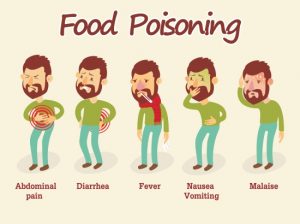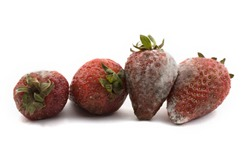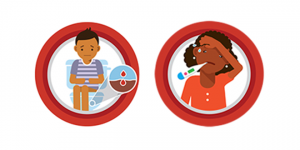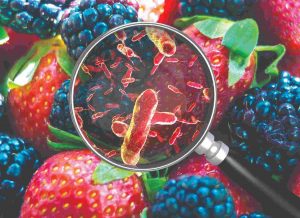Food poisoning is an illness induced by eating food or drinks contaminated with harmful bacteria or eating food contaminated with chemicals called toxins. It can damage health or cause death. Today let’s know more about food poisoning.
What are the features of food poisoning?
- Not infectious in most cases.
- Onset in 4~10 hours.
- It’s subject to individual physical condition. For example, some people are poisoned, but some not, although they eat the same food.

The symptoms of food poisoning
-
Salmonella:
The meat, eggs, or aquatics contaminated with harmful bacteria would cause foodborne illnesses of salmonella. The victims usually have one or more of the following symptoms:
- feel sick
- have a high fever
- stomachache
- diarrhea
- Worse, it may cause cramp, coma, and even death if rescue not prompt.

-
Vibrio parahemolyticus:
Eating fish or crab raw, and eating meat contaminated with bacteria can lead to vibrio parahemolyticus. The victims usually have one or more of the following symptoms:
- Sudden occurrence
- Low fever
- Vomit
- Stomachache
- Diarrhea
- Recover during one week commonly

-
Enterotoxin
This illness results from meat, dairy, and leftovers contaminated with bacteria. The victims usually have one or more of the following symptoms:
- Feel sick
- Vomit especially
- Stomachache
- Diarrhea
-
Clostridium botulinum bacteria
It’s the most serious of the foodborne illness, which cause by meat, eggs, salted fish, meat cans, and soy sauce contaminated with bacteria. The victims would have one or more of the following symptoms:
- Headache
- Feel dizzy & sick
- Vomit
- Blurred vision
- Diplopia
- Swallowing difficulty
- Hoarseness

How to prevent food poisoning?
Given the right conditions such as warmth, moisture, and time, bacteria can easily grow on food and multiply very quickly. That’s why food that is not properly stored or thoroughly cooked can cause foodborne illnesses.
There are four simple steps you can take to prevent food poisoning:
- Clean – always wash your hands before and after handling and eating food, after visiting the toilet or playing with pets or animals
- Cook – make sure that food is thoroughly cooked to destroy any harmful bacteria that might be present.
- Chill – keep food cool in order to prevent bad bacteria from growing; make sure that your fridge is at the correct temperature to keep cold foods chilled – aim to keep your fridge at 5°C or below.
- Separate to prevent cross-contamination – separate raw and cooked foods during storage and cooking and never let raw food. For example,raw meat, come into contact with food that is ready-to-eat.
- Bacteria are found throughout the environment but they concentrate where a food source is available so it is usual for raw food to come into contact with bacteria, most of which are harmless, but some can cause illness.

How to do if you have food poisoning?
For the baby and the old, their immunity system is not as good as the adult. They need to pay more attention to food poisoning cause it may lead to reversible damage to their health. If you think you have food poisoning, the best way is to see your doctor at once. Meanwhile, let’s see how to reduce the damage of food poisoning on your own.
- Drinking plenty of fluids and eating liquid food. A lot of water would be lost because of frequent emesis and diarrhea. You need to take frequent sips of water, apple juice, broth, bouillon, or an isotonic energy drink with electrolytes to reduce the high risk of dehydration. If you feel too sick to supplement any fluids, contact the doctor for help.
- Don’t eat dairy within a few days. Because the whole body is fighting food poisoning, the digestive system would suffer lactose intolerant. Any dairy like butter, milk, cheese, and yogurt would make you more uncomfortable. Don’t eat any dairy before the recovery from illness.
- Avoid eating food that would make you feel sick. If you have food poisoning, fatty or spicy food and high-fiber food would burden the system, which makes you feel sick.

2 Comments